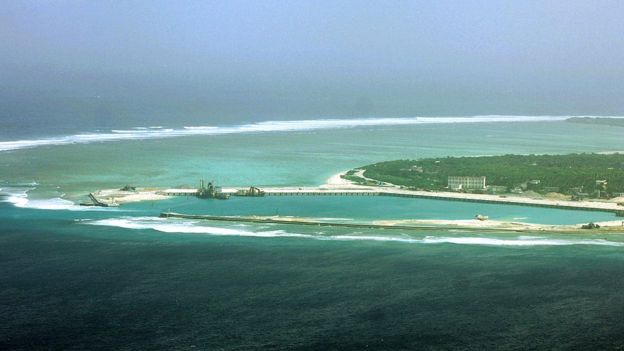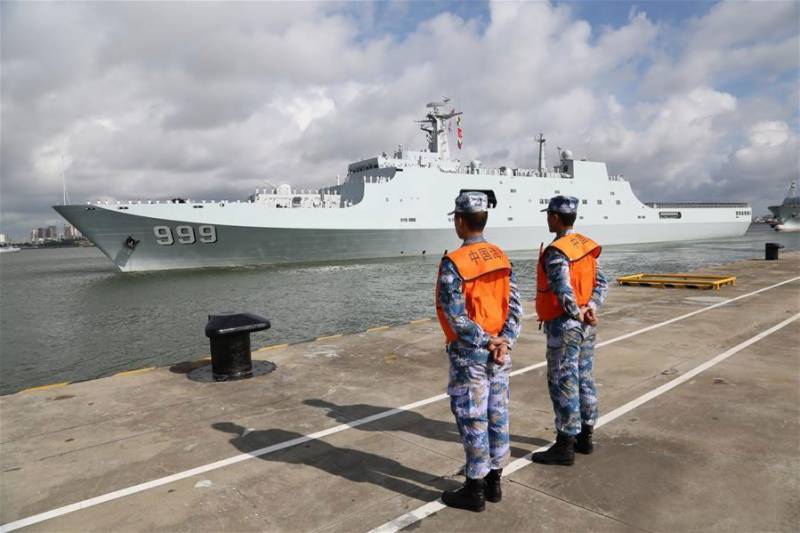
 South China Sea Arbitral Award after One Year
South China Sea Arbitral Award after One YearOne year ago, a PCA Arbitral Tribunal constituted under Article 287, Annex VII of the United Nations Convention of the Law of the Sea, ruled significantly against China in favor of the Philippines. Specifically the ruling rejected China's "historic rights" claim, and stated that there were no naturally-formed 'islands' in the Spratly chain, furthering that the contested features cannot generate their own Exclusive Economic Zones (EEZs). Beijing's dismissed the PCA decision, and found an unlikely supporter in the Philippine's newly elected President Rodrigo Duterte, who last October in a bilateral meeting with Xi Jinping, declared preference for strategic 'separation' from the United States in favor of new alliances with China and Russia.
Since then, as China-US Focus contributor Richard Javad Heydarian writes, "the two countries have rapidly normalized their bilateral relations, upgraded investment ties, and are currently contemplating tightening defense relations." On the one-year anniversary of the ruling on July 12, the Philippines Department of Foreign Affairs issued a statement noting, "Fishermen are back are back exercising their livelihood in Scarborough Shoal. We have received investment and financial assistance commitments upwards of USD 30 Billion from our partners in the region."
Compared to the extensive media coverage, heightened official rhetoric, and ratcheted up nationalist sentiments a year ago, the anniversary appeared to be uneventful with both China and the Philippines issuing restrained statements and responses. China's foreign ministry spokesman had this to say: "With the concerted efforts of the two sides, China and the Philippines have come back to the right track of peacefully solving (sic) disputes through dialogue and negotiation, and the China-Philippines relations have taken an upturn comprehensively. The two sides have committed themselves to advancing friendly and pragmatic cooperation in various fields."
In Lawfare Julian Ku explains how the Philippines' was not able to translate a legal victory into an "actual victory," discrediting the "U.S. under President Obama and Secretary Kerry miss[ing] a huge opportunity to use the arbitral award to impose serious reputational costs on China." He further argued that for the U.S., "a sophisticated global public relations campaign explaining why China really did have a legal obligation to comply with the award would have helped a great deal. But the U.S. could also have taken the opportunity to demonstrate its seriousness by conducting naval operations near and around China's artificial islands and imposing targeted economic sanctions on Chinese companies and individuals taking actions that violate the arbitral award."
In another commentary for China-US Focus, Ian Storey argues that the U.S. under the Trump administration has largely continued the same policies in the South China Sea: asserting the importance of freedom of navigation and overflight operations while providing capacity-building support to Southeast Asian claimants. He warns, however, that "the central drivers of the dispute—nationalism, competition over resources and geopolitics—remain unchanged, and that sooner or later, this period of relative calm is bound to come to an end." Anni Piiparinen of the Atlantic Council provides an interesting take on how Beijing's has and will continue to rely on sophisticated cyber war capabilities to "redefine armed conflict in the South China Sea." China-US Focus has a microsite dedicated to exploring the South China Sea dispute further.
 Will China block All VPNs by February 2018?
Will China block All VPNs by February 2018?In an article first published in Bloomberg, concern swept through China-watching communities that China's Ministry of Information and Industry Technology (MIIT) would order state-run telecommunications firms to bar the use of Virtual Private Networks (VPNs) by February 1, 2018. VPNs, which allow users to circumvent China's internet firewall are "incredibly important for companies trying to access global services outside of China," Jake Parker of the U.S.-China Business Council told Bloomberg.
Global Voices' AdVox estimates that 1-3% of China's internet users rely on VPNs to access blocked sites such as Facebook, Twitter, and the New York Times. Kaiser Kuo, co-founder of the Sinica Podcast and editor-at-large of SupChina said in a Facebook post on Monday: "The number of people using [VPNs] in China is really small, but really vocal — and I don't think they'll just take this lying down. Will reflect very badly on the party. Dark days ahead."
Immediately following the news, not all tech experts were convinced of the claim that all VPN services would be shut down in China. The Beijinger quoted Davide Cali, CTO of the Shanghai-based IT consulting firm Expand as saying, "Most of these recurring 'block VPN' articles are just clickbait." Later this week, China's The Paper (link in Chinese) quoted a statement by China's MIIT stating that VPNs with "permissions," such as domestic and international companies, would not be affected.
What should be made of these conflicting narratives? Matt Sheehan has an interesting theory in MacroPolo:"MIIT's recent pronouncements do signal a real change—the Chinese authorities intend to tighten control over VPNs by co–opting them." This would mean that the CCP could "separate 'authorized' VPN providers (who will be tolerated and maybe even supported) from 'unauthorized' providers (who the Party can cripple with never-ending crackdowns)," effectively nudging VPN users to the CCPs preferred provider. This theory holds water with China's evident attempts over the last few years to fully control cyber activity within its border---and make sure that foreign tech companies comply.
Already global internet companies are beginning to comply with China's data localization rules in order to continue operation in China. On Wednesday, Apple Inc, partnered with a local internet provider company in Guizhou to handle its data storage. In a statement, Apple said, "These regulations require cloud services be operated by Chinese companies so we're partnering with GCBD to offer iCloud."
 Chinese military base takes shape in Djibouti
Chinese military base takes shape in DjiboutiXinhua News reported this week that China has sent military personnel to "set up a support base in Djibouti." China's new base in Djibouti, "marks the first time a long-term garrison of the People's Liberation Army has been established beyond China's borders since their withdrawal from North Korea in 1958." Chinese foreign ministry spokesperson Geng Shuang said that the base "would be beneficial for China to fulfill its international responsibilities in convoys in the Gulf of Aden and the waters off Somalia, and offering humanitarian assistance." Newsweek noted that "China pledged $60 billion in Africa's development in 2015, developing multiple infrastructure projects down the east coast of the continent."
Meanwhile, Taiwan's military is closely watching as a convoy accompanying mainland China's first aircraft carrier, the Liaoning, sailed into the Taiwan Strait after leaving Hong Kong where it took part in the handover celebrations, according to a South China Morning Post report.
 Liu Xiaobo, First Chinese Nobel Peace Prize Winner, Dies at 61
Liu Xiaobo, First Chinese Nobel Peace Prize Winner, Dies at 61Liu Xiaobo, a prominent intellectual whose pro-democracy charter led to a lengthy prison sentence, died on Thursday 7/13, at the age of 61. Terry E. Branstad, the United States ambassador to China, said in an emailed statement to The New York Times, "China has lost a deeply principled role model who deserved our respect and adulation, not the prison sentences to which he was subjected." Liu Xiaobo was only the second Nobel Peace Prize winner to die in detention, after the German pacifist Carl von Ossietzky, who was awarded the Nobel Prize in 1935 and died in a Nazi concentration camp in 1938. Carrie Gracie, Chia editor for the BBC commented, "Comparisons with the human rights record and propaganda efforts of Nazi Germany are particularly dismaying for Beijing after a period in which it feels it has successfully legitimized its one-party state on the world stage." In a poignant commentary for The Washington Post, John Pomfret writes that Liu wasn't an outlier in mainstream Chinese political culture. "Liu was heir to [a] great tradition of Chinese liberal thought. And like his comrades, one day his contributions will get the respect and appreciation that they deserve — not only in China but also across the globe."
 This Week In Chinese History
This Week In Chinese HistoryOn July 15, 1971, President Richard Nixon stunned Americans by announcing a plan to visit communist China during a live television and radio broadcast. The statement marked a dramatic turning point in U.S.-Chinese relations. Nixon undertook his historic visit to China the following year, thus beginning a long and slow process of normalization of relations between the People's Republic of China and the United States. This marked the first time a U.S. president had visited the PRC, ending 25 years of separation between the two countries.The announcement came days after Henry Kissinger, President Nixon's National Security Advisor at the time, secretly visited Beijing during a trip to Pakistan.
Prepared by China-US Focus editorial teams in Hong Kong and New York, this weekly newsletter offers you snap shots of latest trends and developments emerging from China every week, while adding a dose of historical perspective.
- 2017-07-07 Now is the Trump Honeymoon with China Over?
- 2017-06-30 China Passes New Intelligence Law
- 2017-06-23 The End of China’s Honeymoon with Trump & Diplomatic and Security Dialogue
- 2017-06-16 Climate Change and Reliable Data Dealt Blows
- 2017-06-09 India, Pakistan formally welcomed into the Shanghai Cooperation Organization
- 2017-06-02 Once Partners in Fighting Climate Change, Trump Retreats, China Stays Steady on Paris Climate Accord
- 2017-05-26 Chinese Missile Frigates Confronts USS Dewey as U.S. Resumes FON Operations in South China Sea
- 2017-05-19 The Belt and Road Forum Concludes Leaving Behind Mixed Reactions
- 2017-05-12 Beijing, Washington Reach First Trade Deal Under 100-day Plan
- 2017-05-05 Degree of Autonomy Decaying in Hong Kong?
- 2017-04-28 Aircraft Carriers, Submarines, and Jetliners: Now Made in China
- 2017-04-21 Green Cards & Red Lines
- 2017-04-14 U.S Beef for Chinese Chicken? More Hollywood Films in China?
- 2017-04-07 The Xi-Trump Summit in Florida
- 2017-03-31 Google Makes a Comeback to China?
- 2017-03-24 Xi and Tillerson Trade Phrases
- 2017-03-17 Sec. Tillerson Visits Asia ahead of Xi-Trump Summit
- 2017-03-10 Defending China's Defense Budget
- 2017-03-03 The Korean Peninsula Draws Headlines
- 2017-02-22 CPC Meets to Reaffirm Commitments in Anticipation of "Two Sessions"
